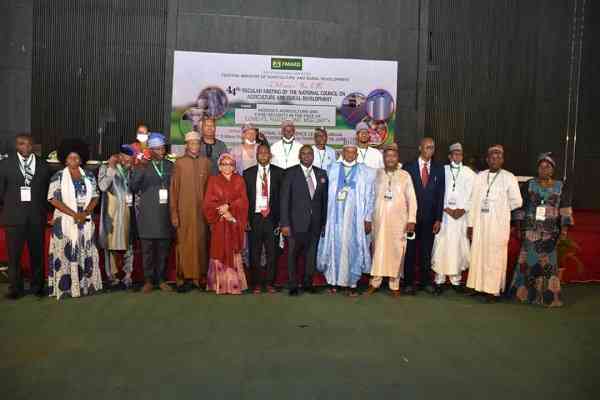Stakeholders in the agriculture sector today, June 15, 2021, met in Abuja to brainstorm on mitigating hunger across the globe.

Declaring the technical session of the 44th regular meeting of the National Council on Agriculture and Rural Development (NCARD) open, the permanent secretary of the Ministry of Agriculture and Rural Development, Dr. Ernest Umakhihe, said challenges arising from the COVID- 19 pandemic, floods and insecurity had conveniently placed agriculture as spring board for socio economic recovery, stabilisation and growth in the face of food insecurity.
He explained that the NCARD with the theme ‘Nigeria’s agriculture and food security in the face of COVID – 19, floods and insecurity’ was geared primarily towards assessing the effects of extant policies and programmes, fine tuning existing strategies and shaping initiatives for agricultural development in the country.
In recognising these challenges, Umakhihe stated that being aware and cautious of the impact of COVID- 19 on the global community as well as climatic change, flooding and insecurity that is posing a threat to food security globally and Nigeria in particular, stakeholders in the 44th NCARD should consider themselves as engine room and should deliberately put strategies in place and explore linkages for increase in production, processing and marketing within the agribusiness ecosystem, to avert food crisis and engender food sufficiency for the growing Nigerian population
The permanent secretary stated that government was committed towards implementing the framework of the National Economic Sustainability Plan and the Nigerian Agricultural Technology and Innovation Plan as a strategy for food resilience and economic development.
He highlighted the Federal Government’s efforts in the sector to include the provision of mechanization, inputs to farmers, training of extension agents on extension service delivery in crop, fishery and livestock value chain activities and construction of mini earth dam for irrigation activities.
Others, according to him, are the facilitation of rice, milk, cassava processing plants, bush clearing, farmers market, commercial pasture plots, windmill-powered boreholes and rural roads, including the conduct of aerial spray against seasonal invasion of quelea birds in the north east and north west frontline states to migrate losses.
He emphasized the commitment of the ministry “to be tied to the commodity value chain concept of strengthening sectorial linkages, import substitution initiatives, value added processing and export-oriented activities in the country”.
Umakhihe stressed the importance of sustaining the collaboration on agribusiness initiatives to facilitate incentives to researchers, farmers and processors geared towards increase in agricultural output and match national requirements.
“This will encourage more individuals and institutions to invest in agriculture and create livelihoods and wealth for the populace. Therefore, we must sustain our cooperation on agriculture and food security for socio economic development in Nigeria,” he pointed out.
Earlier in his welcome address, the Federal Capital Territory (FCT) secretary of agriculture, Mr Ibe Prospect, said the coming of COVID-19 was a wakeup call for a new beginning in agriculture sector because it had shown that nations unable to sustain their internal food supply might not survive in times of grave demand posed by disasters like COVID-19.
Presenting a paper ‘Promoting private investments and financing agribusiness value chains in the face of COVID- 19 pandemic, floods and insecurity’, Abdul – Azeez Olumuyiwa stated the United Nations Food and Agriculture Organisation (FAO) and World Food Programme (WFP) in recent reports stated that “acute hunger is set to soar in over 20 countries without urgent and scaled- up assistance of which Yemen, South Sudan and Northern Nigeria top the list.”


